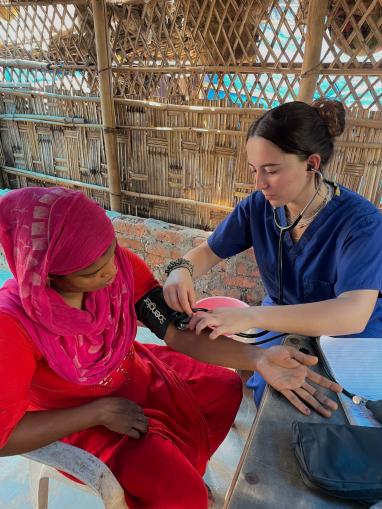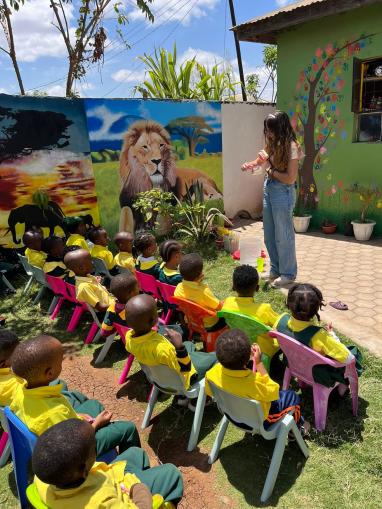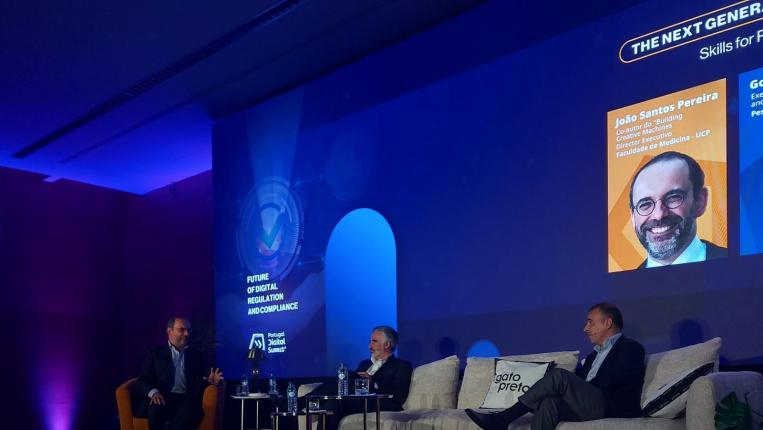

Joana Sampaio, a third-year medical student at Católica Medical School whose commitment to social action is undeniable, has shaped the university landscape and positively impacted communities both nationally and internationally. With years of experience, the President of the Social Action Department embodies academic excellence combined with a profound sense of social responsibility.
With almost a decade of experience in various projects, this student has an active role both nationally and internationally, having worked in countries such as Spain, Tanzania, and India. Out of dedication, she spends her summers in developing countries, where, for months, she significantly contributes to various healthcare programs in refugee camps, community hospitals, reconstruction of nursing homes, and teaching in orphanages with weekly Swahili and English classes.
In this article, we will explore her journey and some of the insights gained along the way.
What motivated you and what advice do you have for people who want to volunteer?
My motivation is fueled by a deep belief in the power of compassion and solidarity. I believe that each of us has the capacity to make a significant impact on the lives of others, regardless of the geographical boundaries that separate us. Throughout my journey, I have witnessed the resilience and strength of communities in challenging situations, and this inspires me to continue dedicating my time and effort to helping those in greatest need.
Furthermore, the satisfaction that comes from my contribution is indescribable, even in its modest form. Every act of compassion, even in its simplicity, can trigger a wave of transformation in the communities we serve, whether through boosting the self-confidence of children or providing additional assistance in deprived healthcare systems.
For those who wish to embark on similar projects, my advice is simple: do not wait for ideal conditions. Start where you are, with what you have. Every gesture, no matter how small it may seem, can impact lives in unimaginable ways.
International volunteering is a two-way path, where personal enrichment is as valuable as the impact it can have on the communities we serve. Be willing to step out of your comfort zone, listen, adapt to new cultural contexts, and embrace empathy as a fundamental tool. Above all, move forward with courage and passion. Leave your mark. Do not underestimate the power of an act of kindness, no matter how modest it may appear.
Share an inspiring or impactful story from your volunteering work that illustrates the importance of student involvement in healthcare outreach.
I recall several situations that left a mark on me, each for different reasons.
This summer, I spent two months in northern India, where I assisted in mobile clinics in slums and community hospitals, but personally, the refugee camps were the most impactful. These camps host thousands of people from Myanmar in an environment where discarded waste accumulates, and living conditions are reduced to wooden structures and awnings. Tasks like wound care, medication prescriptions, and vital sign monitoring became not only clinical actions but vital steps in addressing health challenges aggravated by such conditions. In the midst of adversity, their determination and receptiveness to our initiatives were inspiring.
I also visited a 'Girls' Orphanage' weekly, where girls aged 5 to 28 years old reside. I accompanied them, learned about their perspectives, dream jobs, and goals to achieve. Every hour spent there brought me a sense of compassion and sorrow, knowing they would never have that opportunity. Due to their culture, women are confined to domestic and family roles, where the main source of economic and social security comes from marriage. Over time, I realized that families placed them in the orphanage to avoid expenses, where they wait for years until a family selects them as 'suitable' for marriage. If not chosen, they remain confined to that building alone, as no one else is allowed to see them except for staff and teachers.
In Tanzania, for instance, I dedicated a month to Meru Hospital, where I worked the busiest shift I ever thought possible. In one night alone, there were stabbing incidents where I had to suture tendons and muscles, motorcycle accidents with multiple exposed fractures and cases of cardiac arrest. However, I will always remember that night for the sense of accomplishment when it all concluded.
Nevertheless, not all my experiences have a negative character. For example, in Tanzania, where I arranged a sponsorship from Colgate to provide hundreds of toothbrushes and toothpaste to orphanages, along with an oral hygiene class. Or at the hospital, where I performed spontaneous births for the first time alone, even choosing the babies' names, all patients and doctors which I’m still in touch with.
Are there specific skills or qualities you've enhanced as a volunteer?
Without a doubt. As volunteers in the medical field, we are empowered to face complex challenges, make ethical decisions, and develop skills that enable us to assist not only in treating diseases but also the patients affected by the diseases.
There have been several situations where the solution was minimal or even nonexistent due to a lack of resources, such as in Tanzania and India. I had to improvise, learn new skills, adapt to the conditions presented to me, and find a quick solution in line with treatment protocols or even disease prevention.
Furthermore, working with doctors from different backgrounds can be challenging due to the knowledge barrier each professional obtains in their own country. Therefore, skills such as teamwork and cooperation, whether in a community hospital, remote areas, or refugee camps on the Pakistan border, have grown significantly.
And I can't leave empathy and humility out of this list. Teaching in orphanages and schools was one of the most rewarding experiences I've ever had. Watching the children progress in confidence, character, and behavior with our support was proof that we make a difference, and our effort is valued. It taught me to listen carefully, learn from every interaction, and recognize that knowledge and understanding have no boundaries. It allowed me to connect with the stories and challenges of the people I helped, constantly reminding me of the impact we can have when we see the world through the eyes of others.
These qualities, together, have been the foundation of my volunteer experiences, making them not only meaningful but transformative.
In what ways do you see your volunteering experiences shaping your future career goals and aspirations in the medical field?
I believe that, by witnessing the lack of medical assistance around the world, my desire to make a difference where the need is most pressing has solidified. Humanitarian service through medicine has become not just a career choice but a mission.
I feel compelled to work in diverse and challenging contexts where I can apply my knowledge with cultural sensitivity. Furthermore, ongoing involvement in these communities deepens my understanding of health disparities and the importance of community engagement in addressing them.
Over time, as I become more deeply involved, my determination to play an active role in these communities in my future as a physician increases significantly. I envision myself continuing a legacy of a sense of responsibility that guides me as a healthcare professional and as a person.
Something that motivates me is knowing the difference I can make now and recognizing what I will be able to do in the future, with more experience, even after completing my degree, allowing me to be part of multidisciplinary teams in various international operations.
What resources or support does your university provide to your volunteer journey?
The practicality associated with Católica Medical School’s Curriculum has become a fundamental contribution. With cross-disciplinary courses such as Skills Lab and CORE, we learn how to obtain a patient's medical history, perform physical examination, interpret laboratory tests, and various technical procedures.
This personalized education has given me the skills and confidence to apply them throughout my projects. For example, in Tengeru, Tanzania, after the first year of Medicine, I participated in various surgeries, spontaneous deliveries, HIV clinics, and vaccination efforts, all skills that, even if they required intensive individual study, they were also based on what I had already learned in class.
Furthermore, from the first weeks of the program, we conduct consultations with simulated patients, where we train both the clinical and interpersonal skills that healthcare services require. These were an essential addition to gaining competence in the doctor-patient interaction.



